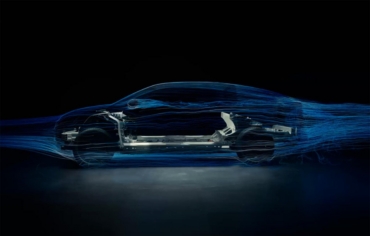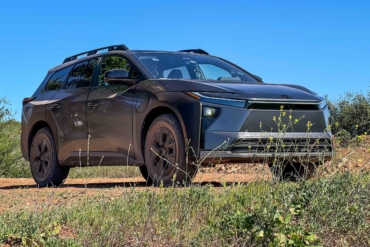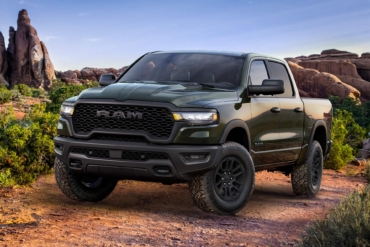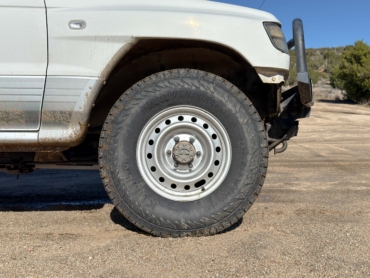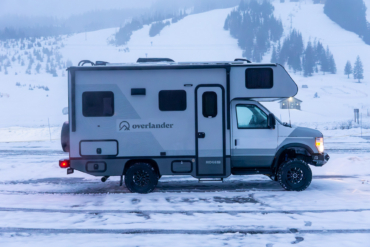Xbus from ElectricBrands is a modular compact electric campervan that will make you forget all about the Volkswagen ID. Buzz.
The ElectricBrands Xbus Camper electric vehicle is a clever and delightful new off-road van life option. It is small in size, has all-wheel drive, and has a max range of close to 400 miles. Think of it as the successor to the classic VW Microbus camper that Volkswagen isn’t yet ready to build itself.
Electric Camper From Germany

ElectricBrands launched the Xbus last year as the eBussy, before quickly changing to the current name. What hasn’t changed is the concept: a modular and compact electric vehicle that is capable of performing multiple roles on-road and off. While offering configurations that make it ideal for more bed space, cabin space, and (the one we’re interested in) for camping and living the tiny van life.
The company starts the Xbus with one of two chassis options. There’s the City, which is more suited to in-town and on-pavement driving. And there’s the Off-Road which is meant for going, you guessed it, off road. Its off-road credentials include all-wheel drive — which all models have — as well as tires with a more aggressive off-pavement tread and an extra half-inch of ground clearance.
4-Motor AWD System

A basic Xbus comes with four electric motors, one mounted in each wheel hub. For regulatory reasons in Europe, the Xbus is meant to fit into the L7e class of EU regulatory framework, making it a Heavy Quadricycle there. The rules help make it smaller and lighter, but also have some big limitations.
Limitations like it can only have 20 horsepower on a continuous basis. Not a big figure, but the motors make 75 horsepower combined at their peak, and this little rig should weigh no more than 1,300 pounds before cargo.
Helping make it a bit punchier, the four motors manage a combined 738 pound-feet of torque. Put everything together and it has a top speed of around 60 miles per hour. It’s not fast, but it seems adequate for use as a camper.
Modular Design Allows More Than Just Camping

Xbus offers a flat-bed Base model, a passenger-holding Bus model, as well as pickups, box vans, and even a cabriolet that might be cooler than the camper.
Because this is a modular van, Xbus simply fits Camping Modules 1 and 2 to turn it into a two-person camper. There is a pop-up roof to let you stand up, at least in the center. It has a fridge, TV, stove, fresh water tank, and sink.
Customers can swap modules, too, making it a camper on the weekend and a cargo-runner from Monday to Friday.
Xbus Camper: Fully Equipped

The Xbus is just 156 inches long and 64 inches wide, or about the footprint of a Honda Fit. In the back, it offers a sleeping area that measures 83 inches by 51 inches. For reference, that’s as long as a queen-size mattress, and nearly as wide as a full-size. Plenty of space for two, especially considering the van’s footprint.
Xbus uses a basic 10-kilowatt-hour battery pack that delivers a range of 60-120 miles. The pack is also cobalt-free, making it more eco-friendly for production and down the road. More battery modules can be added, giving the van much more range — up to 400 miles — and more time off grid. Roof-mounted solar cells help give you even more power when you’re in the wilderness before needing a plug.
American Sales Confirmed

It’s an adorable compact electric runabout; but with those power limitations, will it make sense here? Well, Xbus has already said it plans to sell the vehicle in America.
We’re not sure how it would fit in with our regulations. It could qualify as a low-speed or Neighborhood Electric Vehicle if the top speed was cut. It could also potentially get more electric power and become highway-ready that way. Then again, used exclusively for off-road driving — sort of like the Mahindra Roxor— it would still be an interesting trail rig.
Pricing for the Xbus camper starts from 26,622 euros in Germany, which is around the same in U.S. dollars these days. European customers putting in an order now can expect to see delivery in 2023. No word yet on when we might see them on this side of the pond.



